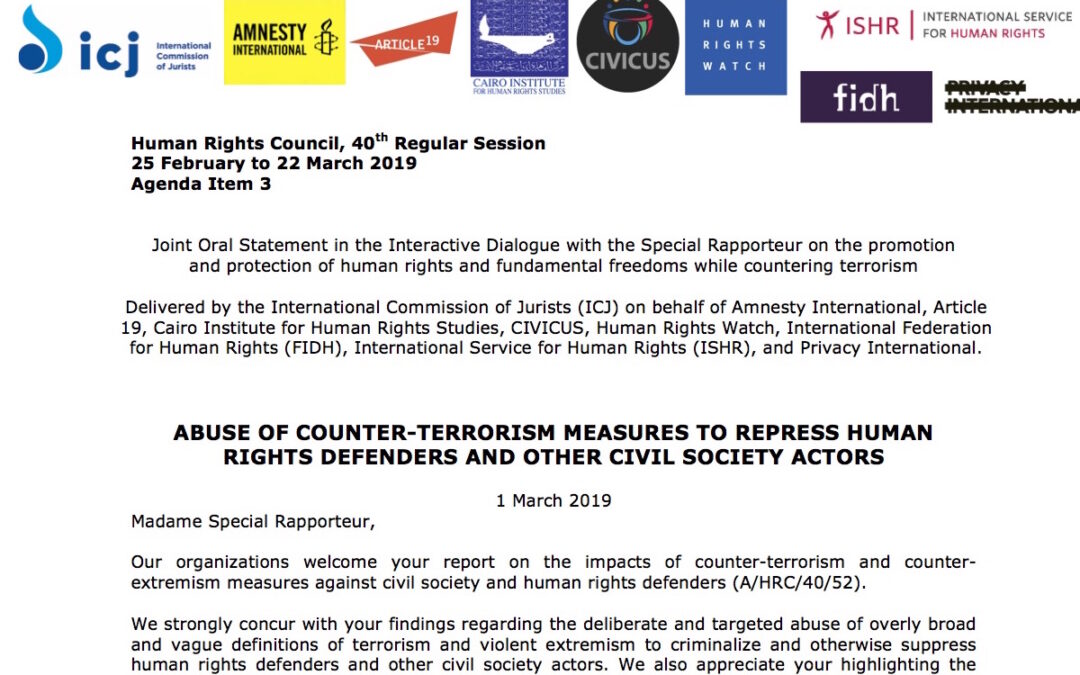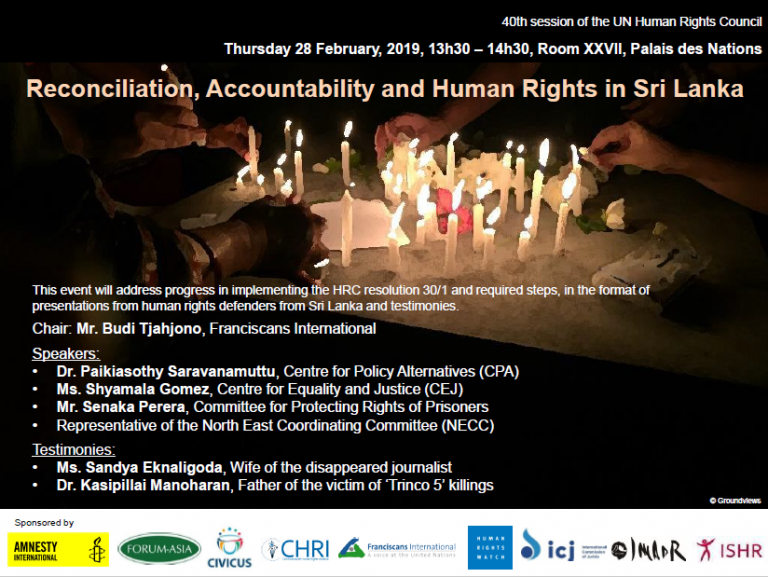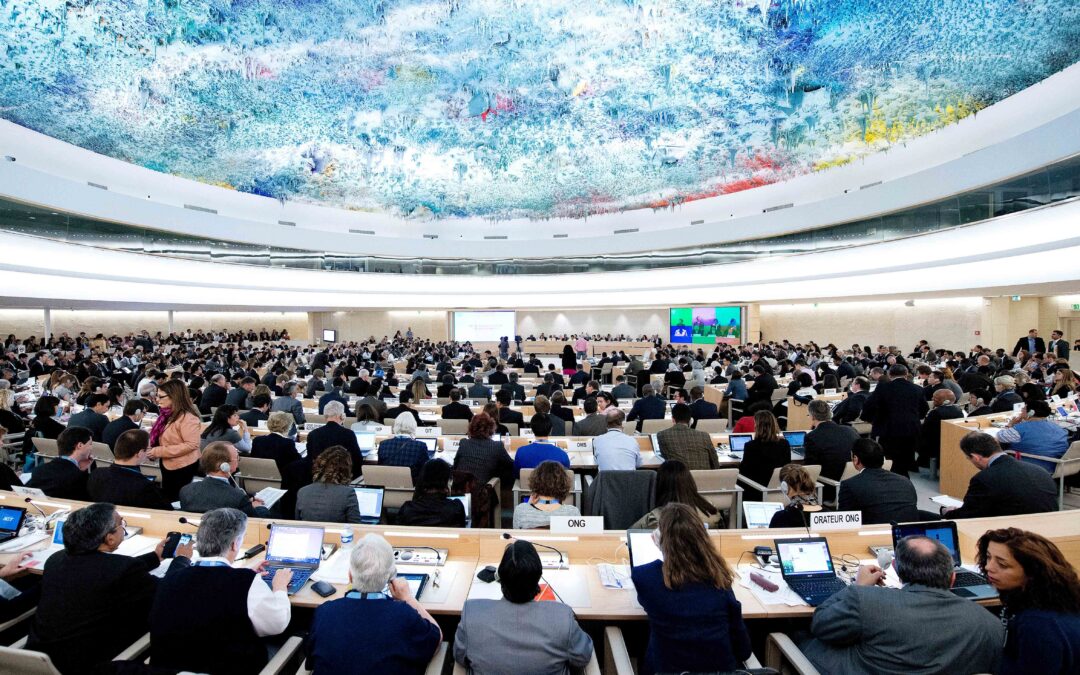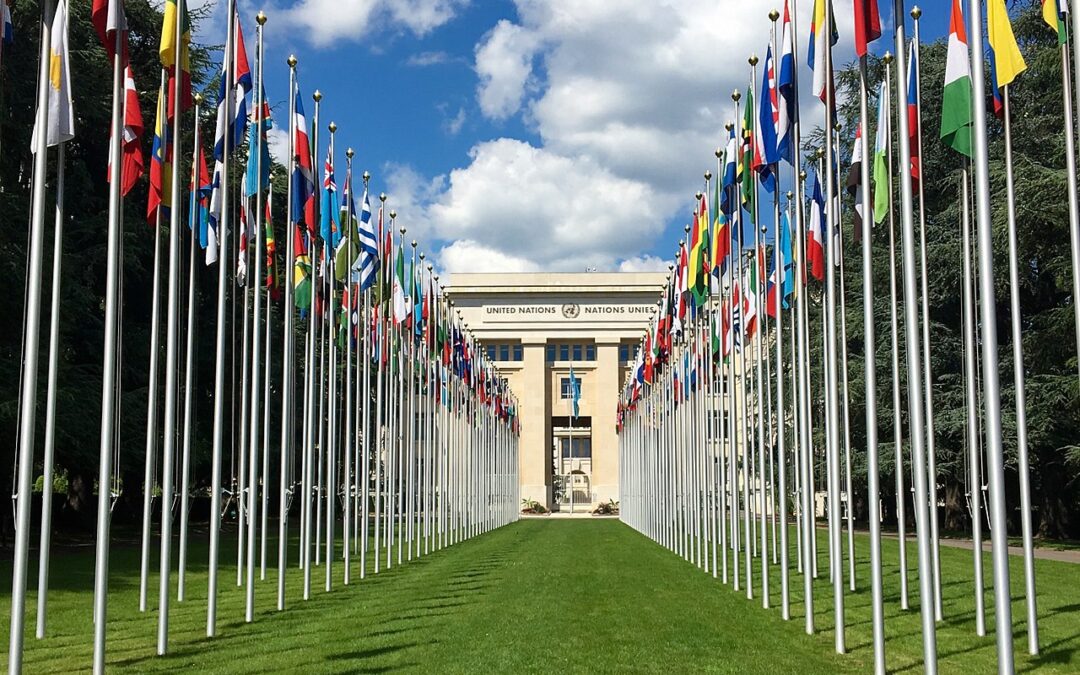
Mar 1, 2019 | Advocacy, Non-legal submissions
The ICJ today delivered a joint oral statement to the UN Human Rights Council, addressing the abuse of counter-terrorism measures to repress human rights defenders and other civil society actors, and highlighting deep concerns about possible moves to allow Egypt a significant role over the UN’s independent expert on human rights and counter-terrorism.
The statement was delivered in an interactive dialogue with the UN Special Rapporteur on the promotion and protection of human rights and fundamental freedoms while countering terrorism. The ICJ made the statement jointly on behalf of Amnesty International, Article 19, Cairo Institute for Human Rights Studies, CIVICUS, Human Rights Watch, International Federation for Human Rights (FIDH), International Service for Human Rights (ISHR), and Privacy International.
The organisations had earlier sent a joint letter to all States’ delegations to the Council in Geneva, highlighting Egypts appalling record of abuse of counter-terrorism measures, and urging States to strongly oppose any attempts to weaken the mandate of the Special Rapporteur, whether by diluting or distorting it by importing the flawed Egyptian-led approach into the Mexican-led resolution for its renewal, or any moves by longstanding leader Mexico to share co-leadership of the mandate renewal resolution with Egypt or other States with such an appalling record in relation to the very issues the mandate is to address.
The joint oral statement to the Council read as follows (check against delivery):
“Madame Special Rapporteur,
Our organizations welcome your report on the impacts of counter-terrorism and counter-extremism measures against civil society and human rights defenders (A/HRC/40/52).
We strongly concur with your findings regarding the deliberate and targeted abuse of overly broad and vague definitions of terrorism and violent extremism to criminalize and otherwise suppress human rights defenders and other civil society actors. We also appreciate your highlighting the need to prevent indirect impacts on civil society.
Among those States with a particularly appalling record of deliberate and targeted abuse, Egypt, which is mentioned in your report (paras 53 and 56), is a prominent example. As Human Rights Watch recently stated: “Using counterterrorism as a guise to crush all forms of dissent could be Egypt’s hallmark of 2018… There’s simply not much room left to peacefully challenge the government without being detained and unfairly prosecuted as a ‘terrorist’.”[1] Other examples from the reports before the Council include Turkey (para 53), Saudi Arabia (A/HRC/40/52/Add.2 paras 21-29), and China particularly as regards Uyghurs and Kazakhs (paras 55 and 57).
We share your concern about the elements lost from the previous Human Rights Council and General Assembly resolutions on “protection of human rights and fundamental freedoms while countering terrorism” in their March 2018 merger with the deeply flawed Egyptian-led initiative on “effects of terrorism” (para 29). We reiterate our call from March 2018 for future versions of the resolution to address the relevant issues exclusively and comprehensively from the perspective of the effective protection of human rights.[2] We strongly oppose any attempts to dilute your mandate, including by importing the flawed Egyptian-led approach into the resolution for its renewal, or any sharing of co-leadership of the mandate renewal resolution with States that have such an appalling record in relation to the very issues the mandate is to address.
Madame Rapporteur, beyond the particular cases mentioned in your report (para 53), what are your views on the broader situation within Egypt in terms of abuse of counter-terrorism measures and what can States, the United Nations, civil society, and other stakeholders do to stop such abuses in the name of counter-terrorism in Egypt and other egregious situations?
Thank you.
[1] https://www.hrw.org/news/2019/01/17/egypt-new-moves-crush-dissent (17 January 2019). See also among others: Human Rights Watch World Report 2019, https://www.hrw.org/world-report/2019/country-chapters/egypt; EuroMed Rights, Egypt – Finding Scapegoats: Crackdown on Human Rights Defenders and Freedoms in the Name of Counter-terrorism and Security (Feb 2018) https://euromedrights.org/wp-content/uploads/2018/03/EuroMed-Rights-Report-on-Counter-terrorism-and-Human-Rights.pdf; Joint NGO Statement, Egypt: Civil society faces existential threat (23 June 2016) https://www.icj.org/wp-content/uploads/2016/06/Egypt-Advocacy-JointNGOStatement-2016.pdf.
[2] Joint NGO end-of-session statement (23 March 2018) https://www.icj.org/hrc37-endofsession/.”
The statement can be downloaded in PDF format here: HRC40-JointOralStatement-SRCTHR-2019-EN
For more information email un(a)icj.org.

Feb 28, 2019 | Events, News
This event will address progress in implementing Human Rights Council resolution 30/1 and required steps, in the format of presentations from human rights defenders from Sri Lanka and testimonies.
Date: Thursday, 28 February 2019
Time: 13.30 – 14.30
Venue: Room XXVII, Palais des Nations
Chair: Mr. Budi Tjahjono, Franciscans International
Speakers:
- Dr. Paikiasothy Saravanamuttu, Centre for Policy Alternatives (CPA)
- Ms. Shyamala Gomez, Centre for Equality and Justice (CEJ)
- Mr. Senaka Perera, Committee for Protecting Rights of Prisoners
- Representative of the North East Coordinating Committee (NECC)
Testimonies:
- Ms. Sandya Eknaligoda, Wife of the disappeared journalist
- Dr. Kasipillai Manoharan, Father of the victim of ‘Trinco 5’ killings
Sponsors:
- Asian Forum for Human Rights and Development (FORUM-ASIA)
- Amnesty International
- CIVICUS
- Commonwealth Human Rights Initiative (CHRI)
- Franciscans International
- Human Rights Watch (HRW)
- International Commission of Jurists (ICJ)
- International Movement Against all forms of Discrimination and Racism (IMADR)
- International Service for Human Rights (ISHR)

Feb 7, 2019 | Advocacy, Non-legal submissions
The ICJ has submitted a written statement on Sri Lanka to the Human Rights Council ahead of its 40th Session in Geneva.
Almost ten years after Sri Lanka emerged from a period of conflict and massive human rights violations, the Government of Sri Lanka still has largely failed to implement its human rights obligations and commitments as reflected in Resolution 30/1.
The ICJ statement focuses on two of four transitional justice mechanisms which the Government committed to establish under the Resolution: (a) the judicial mechanism with special counsel to investigate violations of human rights and international humanitarian law; and (b) the office of missing persons. It highlights how female victims of war are uniquely impacted by the Government’s failure to implement the commitments made before the UNHRC and underscores the importance of holistically including women when such measures are implemented.
Recommendations:
The ICJ considers that the gravity and character of the crimes under international law committed in Sri Lanka, and the failure of the Government of Sri Lanka to meet its obligations and commitments to ensure justice for such crimes including as provided for in resolution 30/1, means that referral to the International Criminal Court or the creation of another international mechanism to facilitate criminal accountability would be fully warranted. If however the Council does not choose to pursue these options at this stage, the ICJ urges the Council at minimum to:
- Continue the monitoring of Sri Lanka through the adoption of a new resolution to ensure that the Government complies with all its obligations and commitments as reflected in resolution 30/1.
- Provide for OHCHR to develop, with the Sri Lankan Government, an implementation strategy with definitive timelines to ensure that the time afforded under the new resolution is utilised to expedite the implementation of measures assured under Resolution 30/1.
- Encourage Member States to exercise universal jurisdiction in order to bring perpetrators to justice.
The ICJ urges the Government of Sri Lanka to:
- Take immediate measures to establish the judicial mechanism with international involvement as contemplated under operative paragraph 6 of Resolution 30/1. The mechanism should ensure gender parity, be accessible for women in civil society, and allow female victims to fully participate in the process.
- Spread awareness regarding the importance of certificates of absence and confirm to the community that issuance of a certificate will not result in the end of efforts to find the person.
- Ensure an overall gender strategy is integrated in all other transitional justice mechanisms that are yet to be established so that structural injustices against women, especially in terms of discrimination and lack of participation, are addressed.
(full text of submission, in PDF: UN-HRC40-SriLanka-WrittenStatement-2019-EN)

Dec 15, 2018 | Agendas, Events
Today begins in Ankara (Turkey) a one-day workshop for lawyers and CSO practitioners on the use and strategies of UPR mechanisms.
This event is organized by ICJ, in cooperation with its partners Kapasite Geliştirme Derneği and Human Rights Joint Platform, as part a/the EU co-financed project Rebuilding and Ensuring Access to justice with civil society in Turkey.
20 lawyers and civil society practitioners are taking part in the workshop on 15 December in Ankara.
The workshop aims at discussing the functioning of the Universal Periodic Review of the UN Human Rights Council in which all States undergo periodically a peer-review of their human rights situation by other States. Turkey is set for its third cycle of examination in 2019
The main thematic areas to be discussed will be access to justice in Turkey, the situation of the judiciary and the rule of law, and the protection of womens’ rights.
The project is funded by the European Instrument for Democracy and Human Rights (EIDHR) of the European Union.
Turkey-Training-Agenda-UPR-Ankara-2018-tur (download the agenda in Turkish)
Turkey-Training-Agenda-UPR-Ankara-2018-eng (download the agenda in English)

Sep 27, 2018 | Nouvelles
La décision prise aujourd’hui par le Conseil des droits de l’Homme des Nations unies de créer un “mécanisme indépendant” pour recueillir des preuves de crimes au Myanmar constitue un pas important vers la responsabilité pour les violations flagrantes des droits de l’Homme, a déclaré la CIJ.
«La création de ce mécanisme de collecte de preuves est une étape concrète bienvenue vers la justice», a déclaré Matt Pollard, conseiller juridique principal de la CIJ.
«Mais il s’agit d’une mesure bouche-trou visant à créer un procureur sans tribunal, ce qui ne fait que souligner la nécessité urgente pour le Conseil de sécurité de référer l’ensemble de la situation devant la Cour pénale internationale, qui a été créée précisément pour de telles circonstances», at-il ajouté.
La décision du Conseil fait suite aux conclusions et recommandations de la Mission d’enquête internationale indépendante sur le Myanmar (FFM).
Le rapport complet de 444 pages de la Mission d’enquête a décrit de graves violations de l’Homme perpétrées à grande échelle des droits contre des groupes minoritaires dans le pays, en particulier dans les États de Rakhine, Kachin et Shan.
Il a également souligné la nécessité d’enquêtes et poursuites pénales pour des crimes sous le droit international, ce à quoi la Mission d’enquête a conclu que les tribunaux nationaux et les commissions du Myanmar ne pouvaient pas y répondre.
«Les institutions judiciaires nationales du Myanmar manquent d’indépendance, de capacités et souvent aussi de volonté de demander des comptes aux auteurs d’atteintes aux droits de l’Homme, en particulier lorsque des membres des forces de sécurité sont impliquées. La dernière enquête établie par le gouvernement dans l’État de Rakhine semble également conçue pour dissuader et retarder la justice », a déclaré Pollard.
La résolution du Conseil des droits de l’Homme n’a pas créé de nouvelle cour ou tribunal international.
Les preuves détenues par le mécanisme indépendant pourraient être communiquées à des procédures internationales ou nationales, que ce soit devant la Cour pénale internationale (CPI) ou un autre tribunal international ad hoc, ou aux procureurs nationaux faisant valoir leur compétence pour les crimes relevant de la compétence universelle ou pour d’autres motifs.
Bien qu’il n’y ait aucune perspective réaliste de poursuites nationales efficaces au Myanmar dans un proche avenir, le mécanisme pourrait également fournir des preuves à l’avenir si les institutions nationales devenaient finalement suffisamment impartiales, indépendantes, compétentes et capables de le faire.
Un examen préliminaire de la situation des Rohingyas, mené par la CPI, peut également donner lieu à des poursuites pénales mais sera probablement limité aux crimes qui se sont déroulés en partie au Bangladesh, tels que le crime contre l’humanité en matière d’expulsion.
Le Bangladesh est un État partie au Statut de Rome de la CPI, contrairement au Myanmar.
Le Conseil de sécurité est également habilité à référer la totalité de la situation devant la Cour pénale internationale.
«Le gouvernement du Myanmar devrait cesser de nier la vérité et collaborer avec la communauté internationale, en particulier les Nations unies, afin d’améliorer les conditions de vie dans lesquelles se trouvent les Rohingya et les autres minorités ethniques, dont les droits ont été violés de manière aussi brutale par les forces de sécurité, comme documenté par la Mission d’enquête », a déclaré Pollard.
«Les partenaires internationaux du Myanmar, y compris des voisins tels que l’Inde et la Chine, et des membres de l’Association des nations de l’Asie du Sud-Est (ASEAN), devraient exercer leur influence pour faire en sorte que le Myanmar s’attaque à cette grave menace à la stabilité du pays et de la région en veillant au respect, la protection et la mise en oeuvre de l’ensemble des droits civils, culturels, économiques, politiques et sociaux des minorités concernées », a-t-il ajouté.
La résolution du Conseil contient plusieurs autres recommandations de fond, notamment un appel au gouvernement du Myanmar à réviser la loi de 1982 sur la citoyenneté et une recommandation aux Nations unies d’ouvrir une enquête sur son implication au Myanmar depuis 2011.
Contact:
Matt Pollard, conseiller juridique principal à la CIJ (Genève), e: matt.pollard@icj.org, +41 79 246 54 75.
Frederick Rawski, directeur régional Asie-Pacifique de la CIJ (Bangkok), e: frederick.rawski@icj.org









